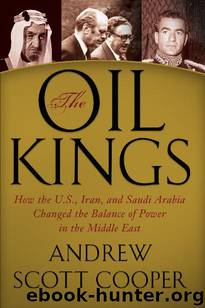The Oil Kings by Andrew Scott Cooper

Author:Andrew Scott Cooper [Cooper, Andrew Scott]
Language: eng
Format: epub, mobi
Publisher: Simon & Schuster, Inc.
Published: 2011-08-09T04:30:00+00:00
President Ford received Prime Minister Takeo Miki of Japan at the White House on August 6. Japan imported 73 percent of its oil from Iran and the Middle East. Miki stressed to Ford the importance of easing tensions in the Middle East and the strain placed on Japan’s economy by high oil prices. “If there should be a fifth war in the Middle East, Japan’s industry would no longer be viable,” he remarked. “For that reason, a Middle East peace settlement is absolutely vital to Japan. Any renewal of hostilities in that area would have an immediate impact on Japan’s access to oil.” He reminded the White House that Japan’s fuel bill was four times higher now than it had been a year earlier, “and we expect our oil bill this year to total 23 billion dollars.” Japan’s economy was “in severe financial straits this year.” The government in Tokyo had built a sixty-eight-day stockpile of petroleum to guard against a second embargo. Its goal was to have a ninety-day stockpile in place by the end of 1976.
President Ford was still leaning in favor of a deal with the Shah on oil so long as it held clear-cut economic benefits for the American economy. The day after his meeting with Prime Minister Miki, Ford listened to Kissinger’s complaint that “Zarb and Greenspan are dragging their feet on the Iranian oil. . . . I had a scenario ready and I have to get an answer to Ansary today. I have no doubt they will approve it, but they want to prove their manhood. I would like to tell Ansary and you can rescind it tomorrow if you want.” Go ahead, Ford said, tell Ansary the deal was on. But still they couldn’t make all the parts fit. The president was unwilling to assert his authority over Treasury. Ford, Kissinger, Zarb, Greenspan, and Scowcroft met again the next day, Friday, August 8, to discuss the impasse. Bill Simon, who was not in the room, was refusing to sign off on the deal.
Then Kissinger’s attempt to link the oil deal to a Middle East peace settlement collapsed on August 15. Israel agreed to evacuate the Abu Rudeis oil fields in return for a written pledge from the White House to supply it with oil in the event that at some future date Iran, Israel’s regular supplier, reneged on the Shah’s pledge made in Zurich to keep the oil flowing.
Brent Scowcroft later recalled that the Economic Policy Board, set up to streamline and formulate U.S. foreign economic policy, “was paralyzed because of the hostility” between Kissinger and Simon. “Anything Henry proposed Simon objected to, anything Simon proposed Henry objected to,” he said. “So it was a very complicated period economically. And that spilled over into oil policy.”
The bickering within the Ford administration left the Shah hanging. He was, not surprisingly, exasperated and irritated by the delay. Court Minister Alam’s diary includes the copy of a letter Mohammad Reza Shah sent to Kissinger dated
Download
This site does not store any files on its server. We only index and link to content provided by other sites. Please contact the content providers to delete copyright contents if any and email us, we'll remove relevant links or contents immediately.
| Arms Control | Diplomacy |
| Security | Trades & Tariffs |
| Treaties | African |
| Asian | Australian & Oceanian |
| Canadian | Caribbean & Latin American |
| European | Middle Eastern |
| Russian & Former Soviet Union |
The Secret History by Donna Tartt(19092)
The Social Justice Warrior Handbook by Lisa De Pasquale(12191)
Thirteen Reasons Why by Jay Asher(8912)
This Is How You Lose Her by Junot Diaz(6889)
Weapons of Math Destruction by Cathy O'Neil(6281)
Zero to One by Peter Thiel(5802)
Beartown by Fredrik Backman(5756)
The Myth of the Strong Leader by Archie Brown(5509)
The Fire Next Time by James Baldwin(5448)
How Democracies Die by Steven Levitsky & Daniel Ziblatt(5219)
Promise Me, Dad by Joe Biden(5154)
Stone's Rules by Roger Stone(5088)
A Higher Loyalty: Truth, Lies, and Leadership by James Comey(4964)
100 Deadly Skills by Clint Emerson(4927)
Rise and Kill First by Ronen Bergman(4790)
Secrecy World by Jake Bernstein(4753)
The David Icke Guide to the Global Conspiracy (and how to end it) by David Icke(4720)
The Farm by Tom Rob Smith(4514)
The Doomsday Machine by Daniel Ellsberg(4490)
